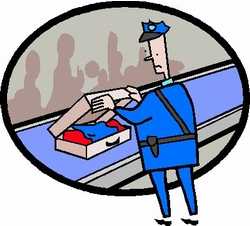See, There Ya Go Applying Logic To The Situation...
 In a scathing editorial this week
titled "Screening Dreams," New York Times columnist Clark Kent
Ervin accuses the Transportation Security Administration of merely
going through the motions to convey a false sense of security to
airline travelers.
In a scathing editorial this week
titled "Screening Dreams," New York Times columnist Clark Kent
Ervin accuses the Transportation Security Administration of merely
going through the motions to convey a false sense of security to
airline travelers.
"The security bureaucracy seems to think that as long as it is
seen as doing something, and so long as another terror attack does
not occur, the public will at least feel secure enough not to
insist that it do whatever needs to be done actually to make us
secure," Ervin writes.
There are numerous examples to back up that position, Ervin
adds, including a series of recent embarrassments for the agency in
which testers were able to slip potential bomb components through
numerous checkpoints with abandon. But a perfect example, Ervin
says, is the TSA's ban on liquids following the thwarting of a bomb
plot in Britain last year... in which terrorists attempted to
smuggle liquid explosives onboard in carry-on luggage, to be
combined to create a bomb inflight.
"Because no technology had been developed to detect or thwart
liquid explosives, the Transportation Security Administration was
forced to take, for a time, the Draconian step of banning all
liquids and gels," Ervin writes. "We were told at the time that
even liquids and gels that are harmless in and of themselves could
become incendiary when combined in sufficient quantity... And,
then, without yet developing any effective counter-technology, the
TSA relaxed the ban somewhat. Small quantities of liquids and gels
can now be brought through security, provided they are sealed in
clear plastic bags. And any quantity of liquids and gels can be
purchased at airport vendors past checkpoints."
Ervin questions why even small quantities of liquids and gels
are allowed, when in theory the danger still remains. "And, yet,
the TSA can say that it’s done something; the "something"
done doesn't unduly inconvenience the traveler or crimp the
economy; and there’s no hell to pay because no terrorist has
yet exploited this loophole to pull off another attack," he
says.
Such an attitude also explains how agents are often able to
sneak bomb components and other weapons through security
checkpoints, despite TSA claims it screens every passenger. Ervin
points to a recent study by the Government Accountability Office
which found screeners at 19 airports failed to detect bomb
components, as reported by ANN.
 "At least the TSA's defense was
audacious, laughably so," Ervin writes. "The agency chief, Kip
Hawley, more or less told Congress that poor results were to be
expected because undercover tests nowadays are much more
sophisticated than they were before 9/11. In other words,
it’s a good thing that screeners are consistently failing
these tests because otherwise the tests wouldn’t be much of a
test."
"At least the TSA's defense was
audacious, laughably so," Ervin writes. "The agency chief, Kip
Hawley, more or less told Congress that poor results were to be
expected because undercover tests nowadays are much more
sophisticated than they were before 9/11. In other words,
it’s a good thing that screeners are consistently failing
these tests because otherwise the tests wouldn’t be much of a
test."
If you have the feeling Ervin isn't a fan of the TSA, you're
right. Nor is he comforted by the agency's assertion there are
multiple layers of security... so if one layer fails, there are 18
more opportunities for screeners to catch a wannabe terrorist in
the act.
"Security layers as a whole constitute a chain that is only as
strong as its weakest link," Ervin writes. "The screener link in
this chain is very weak, indeed. And, as links go, this is arguably
the most important one. Barring the occasional exception, the only
time that passengers and their carry-ons are screened for weapons
is at the checkpoint.
"If ignorance is bliss, let those of who believe TSA press
releases be happy," Ervin concludes. "And if it is better to be
lucky than good, TSA, so far at least, has it made."
One poster to the NYT blog, identified as "Eric," was even more
succinct in his follow-up comment. "TSA is incompetent. They fail
miserably at virtually everything they do."
 ANN's Daily Aero-Term (04.25.24): Airport Rotating Beacon
ANN's Daily Aero-Term (04.25.24): Airport Rotating Beacon ANN's Daily Aero-Linx (04.25.24)
ANN's Daily Aero-Linx (04.25.24) Klyde Morris (04.22.24)
Klyde Morris (04.22.24) Airborne 04.24.24: INTEGRAL E, Elixir USA, M700 RVSM
Airborne 04.24.24: INTEGRAL E, Elixir USA, M700 RVSM Airborne 04.22.24: Rotor X Worsens, Airport Fees 4 FNB?, USMC Drone Pilot
Airborne 04.22.24: Rotor X Worsens, Airport Fees 4 FNB?, USMC Drone Pilot




